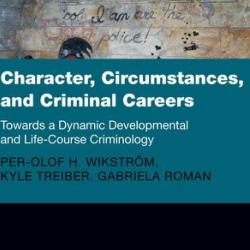Submitted by R. Greene on Thu, 15/02/2024 - 15:27
The Centre for Analytic Criminology is delighted to announce the publication of its latest book analysing data from the longitudinal Peterborough Adolescent and Young Adult Development Study (PADS+) and testing Situational Action Theory (SAT):
Character, Circumstances, and Criminal Careers: Towards a Dynamic Developmental and Life-Course Criminology
By Per-Olof H. Wikstrom, Kyle Treiber, and Gabriela D. Roman
Why do young people engage in acts of crime and what is it that drives their criminal careers? These are the key questions addressed in this latest addition to the OUP Series Clarendon Studies in Criminology. This book makes the case for a more dynamic Developmental and Life Course criminology (DLC), theorising and exploring the relationship between personal characteristics and environmental features and their changes across a critical developmental period for criminal careers: adolescence into young adulthood. It presents advanced statistical analyses of crime trajectories and their association with patterns of development and personal experiences, and examines whether childhood predictors, such as social disadvantage and social adversity, are linked to future trajectories of crime. It presents a special analysis of the age-crime curve and its explanation. It also provides the most recent and updated statement of Situational Action Theory (SAT) and its Developmental Ecological Action (DEA) model, including comparisons between the basic assumptions and propositions of SAT and selected major criminological theories.
Find out more about this book here (https://global.oup.com/academic/product/character-circumstances-and-criminal-careers-9780198865865?q=character%20circumstances%20and%20criminal%20careers&lang=en&cc=gb)

